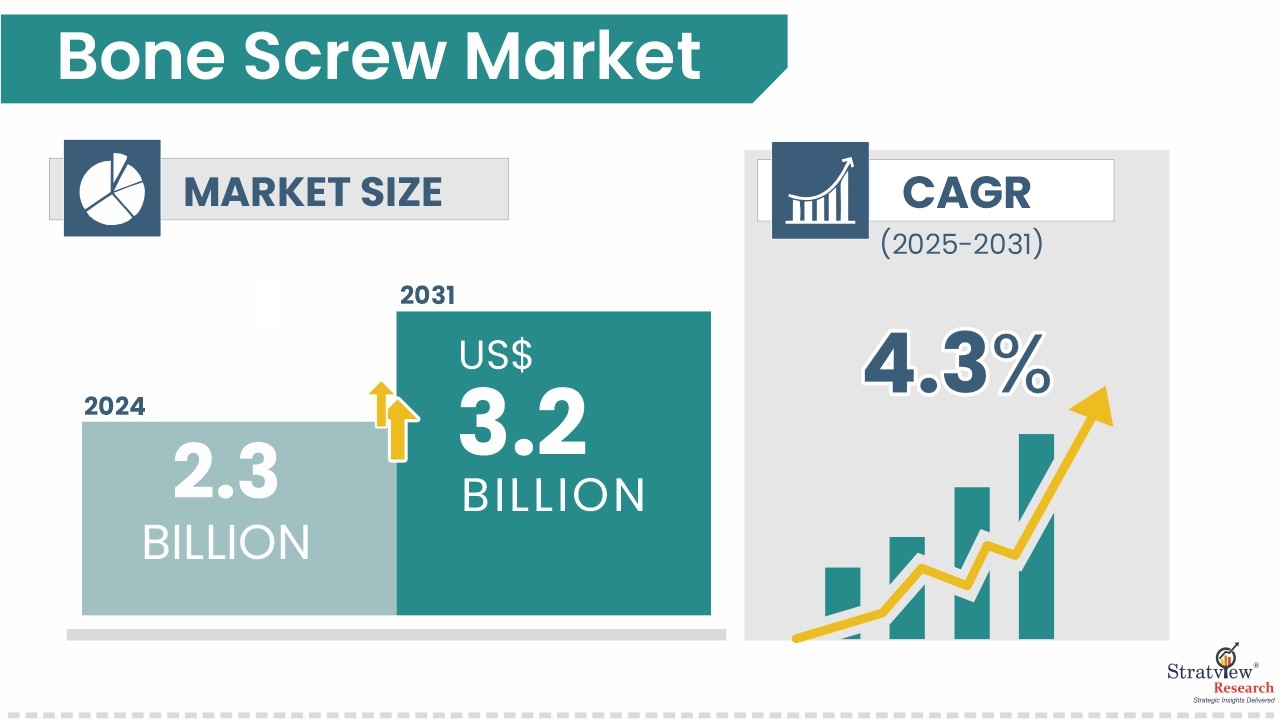Bone Screw Market: Balancing Patient Safety and Technological Progress

Bone screws are fundamental devices in orthopedic and trauma surgeries, used to secure plates, rods, or directly stabilize fractured bones. Their versatility and effectiveness make them indispensable in procedures ranging from spinal fixation to reconstructive surgery. As surgical practices evolve and healthcare systems modernize, the bone screw market is witnessing significant expansion, fueled by both clinical needs and technological innovation.
According to Stratview Research, the bone screw market was estimated at USD 2.3 billion in 2024 and is likely to grow at a CAGR of 4.3% during 2025-2031 to reach USD 3.2 Billion in 2031.
Download the Sample Report Here:
https://www.stratviewresearch.com/Request-Sample/3949/bone-screw-market.html#form
Market Drivers
One of the key growth drivers is the rising burden of trauma injuries. Road accidents, sports injuries, and workplace incidents continue to drive demand for trauma fixation devices, where bone screws are essential components.
The rise in orthopedic surgeries worldwide also supports growth. Increasing awareness of treatment options and expanding healthcare infrastructure in emerging economies are boosting adoption of implants and fixation devices.
Material innovations are playing a major role. Titanium screws, known for their strength and biocompatibility, are increasingly favored over stainless steel. Bioabsorbable screws, which degrade naturally in the body, are becoming popular for pediatric and sports-related applications.
The trend toward advanced surgical techniques such as computer-assisted surgery and robotic-assisted orthopedic procedures is further accelerating demand for precision-engineered screws.
Challenges
The market faces hurdles such as high implant costs, which limit adoption in low- and middle-income countries. Healthcare affordability remains a concern despite increasing demand.
Product recalls and regulatory challenges pose additional risks. Ensuring compliance with stringent safety and quality standards can delay new product launches.
Another challenge is the availability of skilled surgeons. Advanced fixation devices require specialized training for proper implantation, and shortages of trained professionals in some regions hinder broader adoption.
Conclusion
The bone screw market is expanding steadily as demand for orthopedic surgeries and trauma care continues to rise. While costs, regulatory pressures, and training gaps pose challenges, technological innovations and material advancements are helping overcome these barriers. With growing healthcare investments and an increasing focus on patient safety, bone screws will continue to play a vital role in advancing orthopedic and trauma care across the globe.
- Questions and Answers
- Opinion
- Motivational and Inspiring Story
- Technology
- Live and Let live
- Focus
- Geopolitics
- Military-Arms/Equipment
- Securitate
- Economy
- Beasts of Nations
- Machine Tools-The “Mother Industry”
- Art
- Causes
- Crafts
- Dance
- Drinks
- Film/Movie
- Fitness
- Food
- Jocuri
- Gardening
- Health
- Home
- Literature
- Music
- Networking
- Alte
- Party
- Religion
- Shopping
- Sports
- Theater
- Health and Wellness
- News
- Culture

